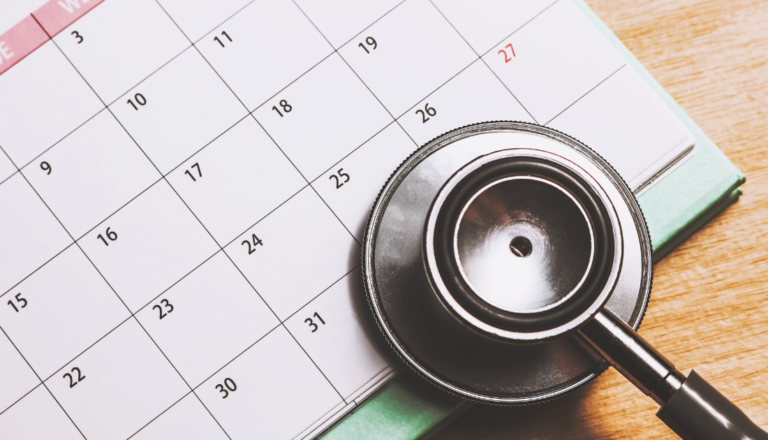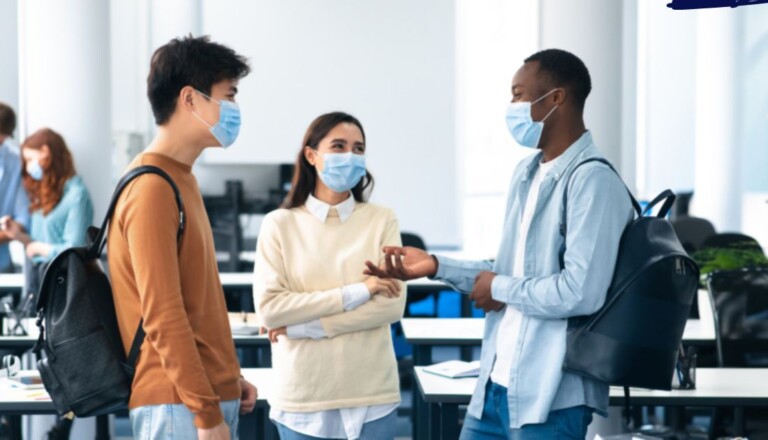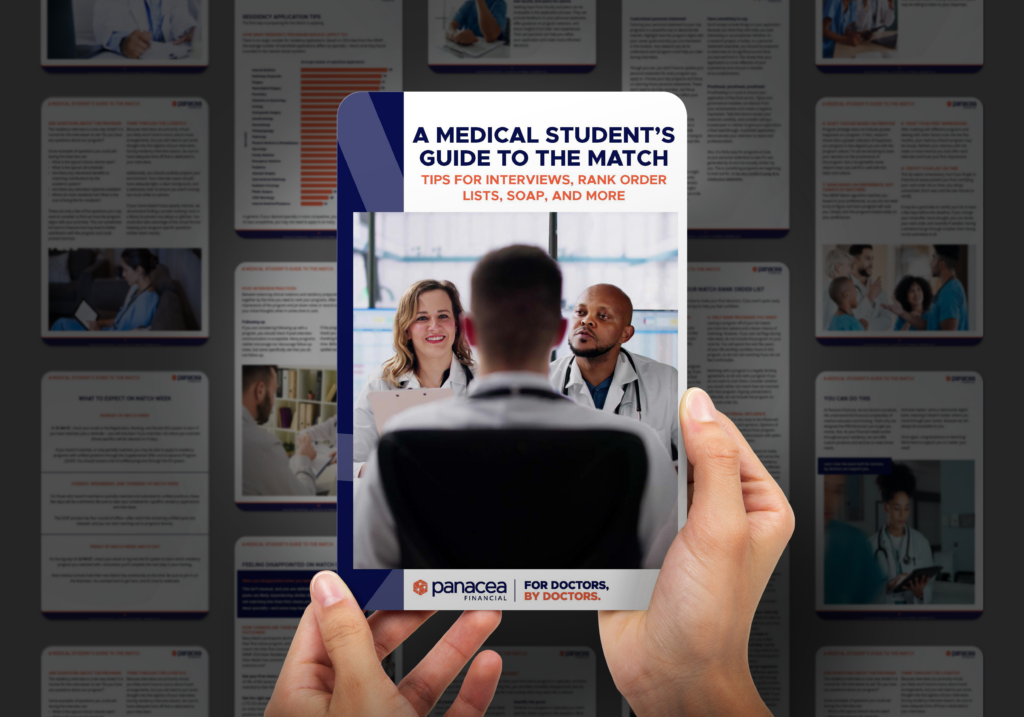A Medical Student’s Guide to the Match

Tips for interviews, rank order lists, SOAP, and more
Keep Reading or Download the PDF ↓
minute read
Skip Ahead
Introduction
The Match is on the horizon for the thousands of fourth-year medical students preparing to apply, interview, and match into the training program where they will spend the next few years.
Are you one of the many preparing for this pivotal moment in your career?
The path to matching is lengthy and complex, with varying directives and deadlines for a number of different requirements. This can be overwhelming as you balance these demands with the end of medical school.
This guide was created to be a comprehensive resource for application and interview tips, rank order list advice, Match week expectations, and more. Let’s get started!
Residency application tips
The first step to preparing for the Match is applying.
HOW MANY RESIDENCY PROGRAMS SHOULD I APPLY TO?
There is no magic number for residency applications. Based on 2024 data from the NRMP, the average number of submitted applications differs by specialty. Here’s what they found (rounded to the nearest whole number):

In general, if your desired specialty is more competitive, you should apply to more programs. If it’s less competitive, you may not need to apply to as many.
DO MORE APPLICATIONS INCREASE MY CHANCES OF MATCHING?
According to 2023 data from the NRMP, applying to more programs doesn’t necessarily translate to better chances of matching. For U.S. MD seniors, matched applicants applied to an average of 68.5 programs, while unmatched applicants applied to an average of 80.
U.S. DO seniors saw similar results. Matched applicants submitted an average of 66.5 applications. Those left unmatched submitted an average of 82. Other applicants (like IMGs) who matched applied to an average of 133.5 programs and unmatched applied to an average of 149.5.
For each type of applicant, matched individuals had a lower average number of applications submitted than those who were left unmatched.
RESIDENCY APPLICATION TIPS
Applying to residency programs can be time-consuming and nerve-wracking, but these tips can help you submit your applications with confidence.
Start early
Residency applications are complex, requiring multiple components like personal statements, letters of recommendation, and other documentation. Starting early gives you ample time to gather materials, refine your application, and avoid the stress of last-minute submissions.
Be strategic with letters of recommendation
Choose your letter writers carefully, selecting those who know you well and can speak to your strengths and potential as a resident. A strong, personalized letter from a faculty member you know well often carries more weight than a generic letter from a well-known name. Consider what each letter adds to your application and how it reflects your fit for the specialty.
Customize your personal statement
Tailoring your personal statement to your top programs is a powerful way to demonstrate interest. Highlight how the program aligns with your career goals and why you are interested in the location. Any research you do to understand each program could help you later during interviews.
Though you can, you don’t have to update your personal statement for every program you apply to. Choose your top programs and focus on tailoring those personal statements. These don’t need to be fully rewritten, but focus on changing a few sentences to reflect your interest in the program.
Ask faculty and peers for advice
Seeking input from faculty and peers can be invaluable in the application process. They can provide feedback on your personal statement, offer guidance on program selection, and share insights from their own experiences. Their perspectives can help you refine your application and make more informed decisions.
Quality over quantity for research
When it comes to research, depth can be more important than volume. Focus on a few significant projects where you made meaningful contributions rather than trying to pad your CV with superficial experiences like conferences and seminars you simply attended.
Don’t forget about the hobby section
The hobby section of your application might seem insignificant, but it’s an opportunity to showcase your personality and interests outside of medicine. Including meaningful hobbies can make you stand out and provide great talking points during interviews.
Have something to say
Don’t simply include things on your application because you think they will make you look interesting or accomplished. Whether it’s a research project, a hobby, or a personal statement anecdote, you should be prepared to elaborate on its significance and what you learned from it. This shows that your application is a true reflection of your experiences and not just a checklist of accomplishments.
Proofread, proofread, proofread
Proofreading is crucial to ensure your application is free from errors. Typos and grammatical mistakes can distract from your achievements and create a negative impression. Take the time to review your materials carefully, and consider asking a trusted peer or mentor to give your application a final read-through. A polished application demonstrates your attention to detail and professionalism.
Also, it is fairly easy for programs to look at your personal statement to see if it was generated by AI and not actually written by you. This is something programs are beginning to look out for, so be very careful if using AI to create your statement.

How Many Residency Programs Should I Apply to? & Other Residency Application Tips
Exactly 44,853 medical students applied and submitted rank lists for the 2024 Main Residency Match, the largest applicant pool of all time. That number is...

When Is Match Day? – Important Residency Match Dates
Match Day is a momentous occasion in the lives of medical students and aspiring doctors around the world. This eagerly anticipated event marks the culmination...
Residency Match Day 2025: What to Expect Before, During, and After
March 21 — aka Residency Match Day 2025 — is a major day for residents all over the country! Leading up to that day, you’re...
Residency interview tips
After applying, interview invitations are sent out in October. Here is what you need to know as you prepare for this phase of the Match process.
WHAT TO EXPECT IN RESIDENCY INTERVIEWS
The switch to virtual residency program interviews happened at the beginning of the COVID-19 pandemic, and the Association of American Medical Colleges has recommended continuing virtual formats with a few exceptions.
Interview processes vary from program to program, but the four most common interview structures are as follows:
- Virtual interview days allow you to meet multiple faculty members and residents over the course over several hours.
- Pre-recorded interviews require you to record yourself responding to provided questions.
- Asynchronous video interviews are discussions with representatives from a single program over many days and times.
- Second-look interviews allow programs and interviewees to have a follow-up discussion before the end of interview season.
RESEARCH THE PROGRAM AND FACULTY AHEAD OF TIME
Before heading into each interview, be knowledgeable about the program. Use the program’s website and social media to understand aspects of the training and faculty.
Consider reviewing faculty members’ interests or the current residents in the program to find commonalities that will make your interactions more personable. The more aligned you are with the program, the happier you may be there as recent research suggests.
Doing this research will especially help you when it is your turn to ask questions. Your knowledge will allow you to avoid asking basic questions that are answered on their website. Higher quality questions will make a good impression on the interviewers and give you a clearer sense of the program culture and feel.
PREPARE FOR COMMON QUESTIONS
Residency interview questions vary by program, but we recommend you prepare for some of the most common questions. Requests like “Tell me about yourself” can be deceptively difficult. Without a clear plan for questions like these, you may find yourself rambling instead of providing a well thought out, concise answer.
Other common questions include:
- What made you want to become a doctor?
- Why did you choose this specialty?
- Why did you apply for our program?
- What challenges have you overcome during your education?
We recommend rehearsing your answers aloud. Actually voicing your answers will help you determine what parts of your answers are valuable and how to make them flow naturally. Videotaping yourself can help you edit areas that are too wordy and reduce filler words like “um” or “like.”
Receiving feedback is another important part of preparation. Your school may offer mock interview services, or faculty members or peers may be willing to listen to your responses.
ASK QUESTIONS ABOUT THE PROGRAM
The residency interview is a two way street! It is normal for the interviewer to ask “Do you have any questions about our program?”
Some examples of questions you could ask during the interview are:
- What is the typical clinical volume seen?
- What is the typical call schedule?
- Are there any retirement benefits or matching contributions by the academic system?
- Are there any relocation stipends available?
- Where do most residents live? What is the cost of living like for residents?
These are only a few of the questions you may want to consider to find out how the program aligns with your priorities. This can sometimes be hard to measure but may lead to better satisfaction with the program and could prevent burnout.
THINK THROUGH THE LOGISTICS
Because interviews are primarily virtual, you likely won’t have to worry about travel arrangements, but you will need to put some thought into the logistics of your interviews. During residency interview season, be sure to have adequate time off that is dedicated to your interviews.
Additionally, you should carefully prepare your environment. Your interview space should have adequate light, a clean background, and a stationary chair to ensure you aren’t moving too much while on camera.
If your home doesn’t have speedy internet, we recommend finding a private meeting room in a library to prevent any delays or glitches. You could also take advantage of the virtual format keeping your program-specific questions written down nearby.
POST-INTERVIEW PRACTICES
Between balancing clinical rotations and residency preparations, your interviews may run together by the time you need to rank your programs. After each interview, reflect on your impressions of the program and jot down notes or record voice memos to help you remember your initial thoughts when it comes time to rank.
Following up
If you are considering following up with a program, you should check if post-interview communication is acceptable. Many programs neither encourage nor discourage follow-up notes, but some specifically ask that you do not follow up.
If the program you are applying for accepts thank you notes, you can send a short email thanking those who met with you for their time. Before you send, triple-check you have spelled each individual’s name correctly.

Match Day 2025: Residency Interview Tips
Match Day 2025 is quickly approaching, and though many anticipate the big day, there is plenty of work to be done to set yourself up...

I Interviewed For Residency… Now What?
You’re starting to complete some residency interviews. Congrats! You’ve prepared for these interviews for months. From submitting your applications to each residency program to thoughtfully...

10 Tips for a Successful Virtual Residency Interview
The world of medical education has evolved rapidly in the face of the COVID-19 pandemic, and one significant change has been the shift to virtual...
Tips for creating your Match rank order list
After a long season of interviews, it is time to make your final decisions. If you aren’t quite ready to finalize your rank list, here are some tips to help you feel confident.
1. KNOW IMPORTANT DATES AND DEADLINES
The most important thing to know as you prepare to create your rank order list is the due date. Missing the deadline means you won’t be eligible for the Match. Find this deadline on the NRMP website.
2. ASK ANY ADDITIONAL QUESTIONS
Getting a full understanding of each program in a single interview can be challenging. If you are narrowing down your rank list and find yourself with additional questions, now is the time to ask. There’s no harm in contacting program directors, faculty members, or current residents who may be able to answer your questions.
3. RANK EVERY PROGRAM YOU INTERVIEWED WITH (WITH EXCEPTIONS)
If you interviewed at a program, we recommend including it on your rank list, unless you had major issues or there was a red flag about the program.
According to the American Academy of Family Practitioners, unmatched students’ lists were typically shorter than matched students’ lists. Including every program you interviewed with will give you a greater chance of matching.
4. DON’T RANK PROGRAMS YOU DO NOT WANT
Leaving a program off of your list means you have less options and a lesser chance of matching. However, if you saw red flags during interviews, do not include the program on your rank list. You will spend the next few years of your life working countless hours in this program, so do not risk matching if you do not feel comfortable.
Matching with a program is a legally binding agreement, so do not rank a program if you do not want to train there. Consider whether you would rather not match than be matched with that program. If going unmatched is preferable, do not include the program on your rank order list.
5. AVOID EXTERNAL INFLUENCE
When ranking, it is very easy to be influenced by external factors and opinions. Opinions of friends and family, feedback from program faculty or directors, and discussions with peers can all influence your decision.
In reality, this decision is only yours to make. Your family, friends, and others will not be the ones directly enduring the trials of residency (but we know many in your life will be affected by your choice). But you have individual needs, aspirations, and desires that must be factored into your final choice…so make the decision based on what YOU want, not everyone else’s opinion.
6. DON’T CHOOSE BASED ON PRESTIGE
Program prestige does not indicate greater happiness at a program. In fact, research shows that a greater indicator of happiness at a program is how aligned you are with the program culture. It can be tempting to base your decision on the prominence of the program, but a recognizable name doesn’t mean you will fit in well with the team and culture.
7. RANK BASED ON PREFERENCE, NOT CHANCE OF MATCHING
The NRMP Match algorithm matches you based on your preferences, so you do not need to try to figure out how a program will rank you. Simply rank the programs based solely on your preferences.
8. TRUST YOUR FIRST IMPRESSIONS
After meeting with different programs and dealing with other factors over the last few months, your memory of each program may be cloudy. Refresh your memory with the notes or voice memos you took after each interview and trust your first impressions.
9. CERTIFY YOUR LIST ON TIME
This tip seems unnecessary, but if you forget or if technical issues prevent you from certifying your rank order list on time, you will go unmatched. Don’t wait until the last minute to certify.
It may be a good idea to certify your list at least a few days before the deadline. If you change your mind after more thought, you can revise your rank order and recertify if needed. Having a tentative list go through is better than having no list submitted at all.

When Is Match Day? – Important Residency Match Dates
Match Day is a momentous occasion in the lives of medical students and aspiring doctors around the world. This eagerly anticipated event marks the culmination...
Residency Match Day 2025: What to Expect Before, During, and After
March 21 — aka Residency Match Day 2025 — is a major day for residents all over the country! Leading up to that day, you’re...

9 Tips For Creating Your Match Rank Order List: Match Day 2025
Match Day is right around the corner. After a long season of interviews, it is time to make your final decisions. As a practicing physician...
What to expect on Match Week
MONDAY OF MATCH WEEK
At 10 a.m. ET, check your email or the Registration, Ranking, and Results (R3) system to learn if you have matched. Just a reminder – you will only learn if you matched, not where you matched (those specifics will be released on Friday).
If you haven’t matched, or only partially matched, you may be able to apply to residency programs with unfilled positions through the Supplemental Offer and Acceptance Program (SOAP). You should receive a list of unfilled programs through the R3 system.
TUESDAY, WEDNESDAY, & THURSDAY OF MATCH WEEK
For those who haven’t matched or partially matched and submitted to unfilled positions, these few days will be a whirlwind. Be sure to clear your schedule for rapidfire residency applications and interviews.
The SOAP process has four rounds of offers—after which the remaining unfilled spots are released, and you can start reaching out to programs directly.
FRIDAY OF MATCH WEEK: MATCH DAY!
It’s the big day! At noon ET, check your email or log into the R3 system to learn which residency program you matched with—and where you’ll complete the next step in your training.
Most medical schools hold their own Match Day ceremonies at this time. Be sure to join in on the festivities. You worked hard to get here, and it’s time to celebrate!

When Is Match Day? – Important Residency Match Dates
Match Day is a momentous occasion in the lives of medical students and aspiring doctors around the world. This eagerly anticipated event marks the culmination...
Residency Match Day 2025: What to Expect Before, During, and After
March 21 — aka Residency Match Day 2025 — is a major day for residents all over the country! Leading up to that day, you’re...

How Does Match Day Work?
Every March, thousands of fourth-year medical students finally learn what they’ve been anxiously wondering for months: where they will be completing their residency training. Also...
Feeling disappointed on Match Day
Were you disappointed when you learned where you matched?
This isn’t unusual, and you are definitely not alone. Some of your peers are likely experiencing similar disappointment whether from not matching into their first choice program or not getting their ideal specialty—and some may have not matched at all.
HOW COMMON ARE THESE MATCH OUTCOMES?
Many Match participants don’t match into their first choice program, and some don’t match into their first choice specialty. The NRMP 2024 Main Residency Match Results and Data details how common different matching scenarios are:
Not your first choice program. In 2024, only 47.9% of MD seniors and 44.8% of DO seniors matched to their first choice program.
Not the right specialty. 5,427 MD seniors and 2,772 DO seniors didn’t match into their first (or only) choice specialty. Out of the 38,941 positions that were filled, over 20% were filled by applicants who did not rank the specialty first.
Didn’t match in the main Match. 6.3% of MD seniors and 7.3% of DO seniors were unmatched in 2024. If you find yourself unmatched on the first day of Match Week, it’s time to SOAP.
OVERCOMING MATCH DAY DISAPPOINTMENT
For those who matched somewhere other than your first choice program or specialty, we know, especially in the early moments of learning this, you are likely incredibly disappointed. But we want to provide encouragement and tips for overcoming what may seem like a setback.
Let yourself be disappointed. Since interviewing and ranking, you’ve likely been dreaming of your first-choice program and first-choice specialty. Finding out that dream won’t be a reality in the way you thought is a tough pill to swallow, so it’s okay to be sad!
Take time to process your feelings. If you feel comfortable, we encourage you to share how you’re feeling with your close friends and family. They will listen to your frustrations and disappointment and help encourage you in what is next. Let yourself grieve a little, then prepare for the great things that are ahead.
You’re not alone. As stated before, over half of all applicants didn’t match into their first choice program, and almost 20% of matched applicants didn’t match into their first choice specialty. Many of your classmates and peers are experiencing the same unexpected disappointment.
Identify the good. Whether in a program or specialty you didn’t plan for, there is good in the situation. What opportunities or experiences will this program give to you that another might not have? If you are moving to a new city, what are you excited to explore there? If in your backup specialty, how will you be able to serve patients in ways you didn’t expect?
Have an open mind. No matter where you ended up, we encourage you to go into the program with an open mind. No one is guaranteed to love their residency program, regardless of where they placed it on their rank order list. Over time, you may find yourself loving the program or specialty.
Resist finality. Match Day feels final, but trust us, it’s not. If you discover that you truly don’t like the program or specialty, you may be able to switch. This decision may come with challenges or extend your training, but it is important to know that you do have options if needed. Before making the decision to switch, you should know there can be caveats for this situation in your employment contracts, so be sure to read it carefully.
SOAP
If you find out you didn’t match at the beginning of Match Week, you will be provided with a list of unfilled positions and the Supplemental Offer and Acceptance Program will begin.
After receiving the list of unfilled positions, you can apply to these programs. They will then rank the applicants, and you will be able to accept or reject any offers you may receive. This sequence of events will happen three more times to fill any remaining spots before the process comes to a close on Thursday night.
Click to find tips for the SOAP process.
If after completing SOAP you are still unmatched, it is time to take a deep breath. This week has likely been a whirlwind of emotion and activity as you have applied to other programs and received feedback. Now, it is important to take a moment to rest. Surround yourself with friends and family who will encourage you. Know you are not alone.

Feeling Disappointed On Match Day? What’s Next? – Match Day 2025
According to the NRMP 2024 Main Residency Match Results and Data, less than half of all Match Day applicants were matched with their first choice...

What To Do If I Didn’t Match: SOAP Tips & More
Every year, thousands of medical students apply and interview for residency. In 2024 alone, 50,413 applicants submitted a certified rank order list of their preferred...

What Happens If I Didn’t Match Into A Residency Program?
In 2024, 6.3% of MD seniors and 7.3% of DO seniors were unmatched. If after completing SOAP you are still unmatched, it is important to...
You’ve matched! Now what?
You’ve just received the best news: you matched to a residency program!
After celebrating (and make sure you do, because you earned it), it’s time to start planning. After all, Match Day is in March, and most residency programs start around July 1.
In other words: your life is about to change very, very quickly. Here are a few things you can do to prepare.
COMPLETE THE REQUIRED PAPERWORK
Before you start your residency, your residency program will need to collect quite a lot of information from you—and fast. They may ask you for any number of things including your Social Security card, birth certificate, driver’s license, CV, and vaccination records.
FIND A NEW HOME
Moving to a different city? You need to figure out where you’re going to live.
First, determine how much you can afford for housing (see below about creating a budget). This will also help you decide whether you can live on your own—or if you need shared accommodations.
Then, go online to look for available places. You can also reach out to the current residents or your residency program coordinators for tips on where to live. And if you need one, they may be able to connect you with other residents in search of a roommate.
Here are a few additional things to consider:
- Do you have time to visit your new city to look at places to live? While it’s ideal to see prospective homes in person, you may have to resort to virtual tours.
- You may need to break a lease or mortgage. Will you need to pay a fee?
Packing can take a lot of time. Rather than doing everything 1-2 days before you leave, consider doing a bit of packing each day leading up to your move. - Moving to a new city can be expensive. You’ll want to investigate different options to see what fits your budget. Self-moving can save you a lot but takes up lots of time and energy. Using a moving service is more expensive but can reduce the hassle. If you use a moving service, secure the best price possible by booking your movers several months in advance.
GET YOUR FINANCIAL DUCKS IN A ROW
The average first-year resident makes about $63,000—which means you’re about to go from negative dollars to positive dollars, but not very many positive dollars.
Your rent or mortgage payment will likely be your most expensive monthly bill. Once you know how much you will spend on lodging, start creating a monthly budget to reflect your new financial situation. This will help ensure you always have enough money for the things you need and the things that are important to you.

Prioritizing Your Finances in Residency
Managing your personal finances can be challenging at any age and in any stage of your career but especially while in residency. Residents often earn...

Tips For Budgeting, Benefits & Expenses During Residency From Physicians
The transition from medical school to residency can be a challenging task, especially with limited income to cover living expenses and other needs. With long...

How to Cover Expenses During Medical Residency
Key takeaways: Credit cards, borrowing from friends and family, moonlighting and personal loans are options to mitigate expenses during residency. All have their benefits and...
You can do this
At Panacea Financial, we are doctors ourselves. We understand the financial complexities of medical education and training. That’s why we designed the PRN Personal Loan to get you money, fast. As your financial needs evolve throughout your residency, we can offer custom products and services to meet those needs.
And even better: we’re a nationwide digital bank, meaning it doesn’t matter where you move through your career, because we will always be accessible to you.
Click to learn how the bank built for doctors, by doctors can support you.
Once again, congratulations on Matching! We’re here to support you no matter your need!
Download the PDF
